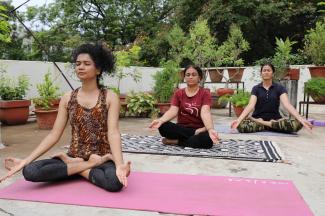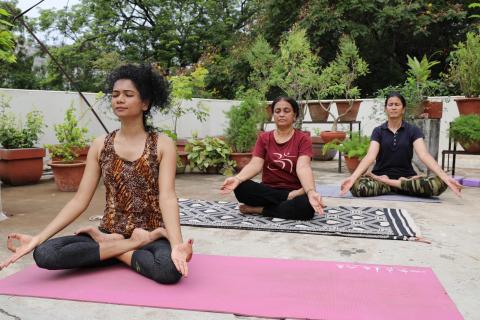
There is increasing evidence on use of Yoga as a complementary therapy for people undergoing active treatment of breast cancer, and for coping with mental health, fatigue and range of motion issues in survivors. With Dr. Rohini Patil of Knitted Knockers.
More studies are showing that yoga improves Quality Of Life for breast cancer survivors and those undergoing active treatment. We have also learned from many personal lived experience on how yoga has benefitted them. Dr. Rohini Patil and yoga instructor Soniya gajre have contributed the pictures in the photo gallery below for the asanas.
Yoga is an effective complementary therapy which helps to
• reduce fatigue
• improves quality of sleep
• increases flexibility
• improves stamina & strength
• decrease stress, anxiety & depression
• prevent development of breast cancer related lymphedema as well as helping to revert back limb size near to normal along CDT.
• helps in lowering certain hormones eq: insulin, estrogen & cortisol
Article continues after this image. Image has Soniya Gajre, Keka Roy and Dr. Rohini Patil from front to back

In the photo gallery at the end of the article are a sample of yoga asanas for breast cancer survivors to bring back range of shoulder movements and open up the chest which is having scar & fibrosis . Also stretching & strengthening of upper extremity
Some ongoing studies on the effectiveness of yoga are referenced below
1. According to a study being conducted by the Tata Memorial Centre in Mumbai, yoga showed numerically better scores in all aspects of QOL, which reached statistical significance in domains related to fatigue, emotional score, pain score and improved compliance to treatment. In overall quality of life, 52% women on yoga showed an improvement from baseline compared to 42% in the control group.
2. For women with breast cancer undergoing radiation therapy, yoga regulates stress hormones and offers unique benefits beyond fighting fatigue, according to research from The University of Texas MD Anderson Cancer Center.
The preliminary findings were first reported in 2011 by Lorenzo Cohen, Ph.D., professor and director of the Integrative Medicine Program at MD Anderson, and are now published in the Journal of Clinical Oncology. This research is part of an ongoing effort to scientifically validate mind-body interventions in cancer patients and was conducted in collaboration with India’s largest yoga research institution, Swami Vivekananda Yoga Anusandhana Samsthana in Bangalore, India.
3. Meditation, yoga and relaxation with imagery are now being included in the clinical practice guidelines on use of integrative therapis as supportive care in patients in treatment for breast cancer. The three methods are known to be calming for those who practice them, and the researchers gave the practices an “A” for treating symptoms of mood disorders that are highly common among people with a recent diagnosis.






